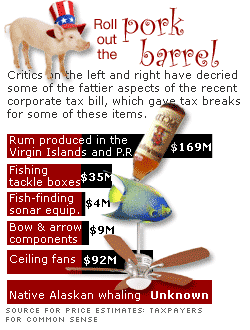NEW YORK (CNN/Money) -
Despite nervous hand-wringing in the media about federal budget deficits, U.S. lawmakers on both sides of the aisle are holding strong, valiantly flinging pork far and wide.
This in turn is raising criticism from left and right that they're burying what might actually be a half-decent piece of legislature in a mountain of fat.
The $34 billion corporate tax bill passed last week by the House of Representatives has been called "a masterpiece of bad legislation" by the editors of the allegedly liberal New York Times and "an arbitrary auction of taxpayer money" by the editors of the allegedly conservative Washington Times.
A similar bill was recently passed by the Senate, and soon a conference committee will begin to reconcile the two, both of which began simply as a way to eliminate export subsidies that caused the European Union to punish U.S. imports.
While European penalties continue to hammer away at U.S. exporters, U.S. legislators will do battle over the following slabs of pork cooked into the House bill:
- A $9.6 billion buyout of tobacco farmers, ending a 70-year-old subsidy system, put into the bill to entice several Southern Democrats to play along.
- A tax break for rum produced in the U.S. Virgin Islands and Puerto Rico.
- The elimination of an excise tax on fishing tackle boxes.
- The elimination of an excise tax on fish-finding sonar equipment.
- A tax break on bow and arrow components.
- A suspension of duties on ceiling fans.
- A tax deduction for some expenses of native Alaskan whaling (insert pork/blubber comparison here).

Along with breaks for liquor, aircraft, shipping and other industries, the watchdog group Taxpayers for Common Sense (TCS) has identified some $19.5 billion worth of fat in the new bill.
TCS Vice President Keith Ashdown called the bill a "platinum-plated pig" and a "Super Bowl of subsidies."
Derision for the pork in the bill has been bipartisan. From the left: House Minority Whip Steny H. Hoyer, D-Md., called the bill "an orgy of self-indulgence," according to a Washington Post report.
From the right: "It is an ugly bill," said Stephen Moore, president of the Club for Growth, a conservative policy group. "This is the legislative process at its worst."
A beautiful bill buried in blubber?
The sad thing about it, Moore and other observers say, is that there may be a beautiful bill buried beneath all that blubber. Moore, in fact, thinks the positive aspects of the bill would make it worth President Bush's signature, despite all the ugly attachments.
|
 |  | Year |  | Combined deficits |  | 1994 | 4.6% |  | 1995 | 3.7% |  | 1996 | 2.9% |  | 1997 | 1.8% |  | 1998 | 1.5% |  | 1999 | 1.8% |  | 2000 | 1.8% |  | 2001 | 2.6% |  | 2002 | 6.1% |  | 2003 | 8.4% |
|  |  |
| Sources: Bureau of Economic Analysis, Congressional Budget Office, CNN/Money |
|
Moore's favorite piece is a provision that encourages U.S. companies to move revenue from overseas back into the United States, something he says could result in a $100 billion tidal wave of cash and a bunch of U.S. jobs. He also likes the plan to cut the income tax rate for manufacturers to 32 percent from 35 percent.
"We're learning the lesson that when we put people back to work and give companies an incentive to invest, it does create revenue-generating activities," Moore said. "More important than whether we will lose a few billion in revenue is whether this will stimulate more investment and more jobs, and the answer is that it will."
Liberal economists disagree. They say the $100 billion wave of repatriated revenue is probably wishful thinking. They say budget-busting provisions need to be offset by measures to raise revenue.
And they say the bill could be costlier than it looks because it uses the old trick of giving the tax breaks an expiration date. If Congress decides it wants to extend the breaks at a later date -- as it usually does -- the price tag will be higher.
"I can see the bill raising revenue in the short run, and maybe some revenue from overseas will be brought back," said Joel Friedman, a senior fellow at the Center on Budget and Policy Priorities, a liberal think tank. "But there's no guarantee, and it's unclear that the money would go for new investment or anything that would stimulate jobs in the short run."
Friedman said he, too, found aspects of the bill he liked, including the closure of some tax loopholes and some other revenue-generating measures. But he also noted that a study by Congress's Joint Tax Committee found that, if the bill's provisions aren't allowed to expire, the cost of the bill will jump from $34 billion to $190 billion by 2014.
The budget deficit as a percentage of gross domestic product in 2003 was the highest in a decade and is expected to climb again this year. Analysts of both political persuasions are worried about the government's ability to pay its bills when the Baby Boom generation starts to retire en masse.
Many analysts said the pork in the latest tax bill was necessary to grease the bill to passage, but they also believed the Bush administration could -- and perhaps should -- put enough pressure on Congress to trim the fat and make a healthier bill.

|

